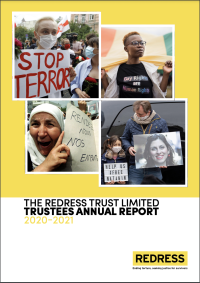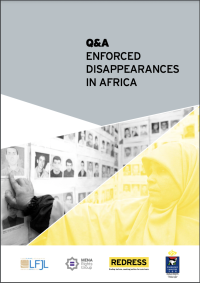Publications
REDRESS’ publications are also available in hard copy format. Please contact us for further information on [email protected].
In this submission, REDRESS and eight other civil society organisations request States to include provisions on asset recovery in a new multilateral treaty that is being drafted.
In a letter released ahead of the 3rd cycle Universal Periodic Review (UPR) of Sudan, REDRESS joined more than 53 Sudanese, regional and international organisations in calling on the UN Human Rights Council to address the ongoing political crisis in Sudan. The signatories highlight that the Human Rights Council must raise the grave human rights violations that have occurred since the military coup on 25 October 2021.
REDRESS responded to the International Development Committee’s Call for Evidence in its inquiry into the effectiveness of the UK’s approach to atrocity prevention. REDRESS’s submission outlined how the Government’s use of Magnitsky sanctions currently interacts with the UK’s approach to atrocity prevention, and how Magnitsky sanctions could be used more effectively in this context.
This briefing explains the key objectives of the All-Party Parliamentary Group on the Magnitsky Sanctions. It details what should be the priorities of the UK government and its range of policy and advocacy activity.
This report provides information on REDRESS's activities from 1 April 2020 to 31 March 2021, including a review of our impact and activities, governance and management, and a financial review; an Independent Auditors Report, with their opinion on the accounts of the charity for the financial year, and a Statement of Financial Activities, with a detailed review of our finances for the year.
This Q&A aims to help journalists navigate the complexities of reporting on enforced disappearances in Africa, a particularly cruel human rights abuse that is prevalent on the continent, frequently used by governments as a method of repression, terror, and stifling dissent. Human rights advocates, political opposition, union leaders, journalists and minority groups are often targeted. The Q&A addresses key concepts and terminology; the main contexts in which it happens in Africa; the main obstacles faced by victims seeking justice; and the shortcomings in the available data. It also offers guidance on how to mitigate the risks to journalists and victims when reporting on enforced disappearances.
In a letter distributed on 28 October, REDRESS joined more than 35 Sudanese, African, and international civil society organisations in calling on the UN Human Rights Council to convene a special (emergency) session to address the ongoing political crisis in Sudan, following the 25 October military takeover of the transitional government. The signatories stress that the Human Rights Council has a responsibility to act urgently.
Early on the morning of October 25 2021, Sudanese security forces arrested at least five civilian members of Sudan’s transitional government, including the prime minister and other officials and key political leaders. The military announced the dissolution of the joint civilian-military transitional government. In response, in a briefing distributed to members of the UK Parliament on 25 October, REDRESS called on the UK Government to take several urgent steps.


